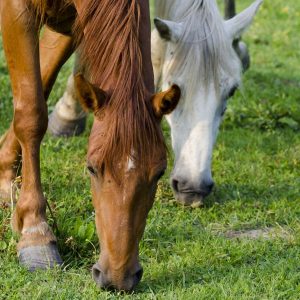
Gastric Ulcer Treatment: A Two-Step Approach
Veterinarians and horsemen recognize the harmful effects of gastric ulceration in their horses. Colic, chronic diarrhea, decreased appetite, and weight loss are documented clinical signs of gastric ulceration. Anecdotal reports point to changes in behavior as well, including depressed attitude or a surly, sour disposition.
Fortunately, scientists and nutritionists identified the frequency in which gastric ulcers occur in horses and formulated products that aid in their prevention and treatment. The goals of gastric ulcer treatment are to eliminate clinical signs, promote ulcer healing, prevent ulcer recurrence, prevent complications, and reduce the cost and duration of treatment. Many products are available for the treatment and control of acid-related diseases. These include compounds to inhibit gastric acid secretion such as proton pump inhibitors, and compounds to buffer gastric acid such as gastric-acid neutralizers.
Proton pump inhibitors
Proton pump inhibitors prevent the production of acid by the stomach. These compounds work by blocking the enzyme in the wall of the stomach that creates acid. With acid production on hold, the stomach and esophagus are given time to heal. Proton pump inhibitors induce a prolonged antisecretory effect, allowing for once-daily dosing. Omeprazole is the most popular proton pump inhibitor used in horses.
Gastric-acid neutralizers
Gastric-acid neutralizers represent another form of gastric ulcer therapy. Most are mixtures of aluminum hydroxide and magnesium hydroxide. Based on data from several studies in horses, it appears that gastric acid neutralizing products lower the pH in the stomach. This creates an environment in which ulcers are less likely to develop. Equine practitioners believe that administration dependably relieves clinical signs associated with gastric ulceration. Proton pump inhibitors and gastric-acid neutralizers have distinct purposes in the management of gastric ulceration.
Proton pump inhibitors like omeprazole can heal lesions in the stomach. Though treatment is expensive, this must be the first step taken to cure the ulcers already present in the stomach. Once an appropriate course of a proton pump inhibitor is concluded, a gastric-acid neutralizer is given as long as the horse is susceptible to gastric ulceration (especially during stressful times such as hard training and competition schedules or frequent stall confinement). Gastric-acid neutralizers are safe for long-term use and are often available in a form, either powder or pellets, that allows for ease of feeding.
Neigh-Lox® is a gastric-acid neutralizer scientifically formulated to maintain normal stomach pH. Neigh-Lox is appropriate for horses of all ages, from foals and weanlings to mature performance horses competing in any sport.
Cost comparison
Omeprazole……………………………………..$9.50/day
Neigh-Lox………………………………$2.80-$4.20/day
(cost varies depending on daily feeding frequency)


